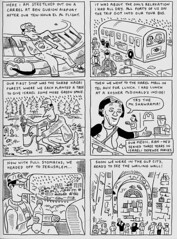Less than 24 hours remain before President Bush delivers his second inaugural, and for liberals like me, this is truly the winter of our discontent. Despite 55 million people voting for John Kerry in November, turnout proved still stronger for Dubya, and Bush enters Term Two with a solidified grip on Congress and a chance to add more conservative justices to the Supreme Court.
It's a hard time to be a blue-state resident (don't blame me, I'm from Massachusetts) and a young person (although, at 26 years old, I'm starting to feel my age). The rest of the republic has rejected the liberal mantle of Massachusetts, New York, California and ... not too many other states. Thank God for the cities -- if it weren't for them, Kerry's numbers would have been truly dismal. Why doesn't mainstream America like the blue states? States like Massachusetts are blessed with plenty of opportunities -- educational, cultural, and social. We're not even as liberal as people claim; all three states I just mentioned have Republican governors. Karl Rove and company have unfairly demonized blue states, just as Massachusetts liberals stereotype the South.
Meanwhile, the right's development of a presence on college campuses is showing increasing strength -- as this
article from the Wall Street Journal attests. Liberals may cringe, but this is a positive change -- in a truly welcoming environment, all voices must be listened to. Neither left nor right has learned this; the periods of McCarthyism and political correctness bear this out. The college campus should be a place where ideas are discussed freely, not censored for fear of offending someone.
The interesting aspect of this article is that it points to a new kind of Republican: many of the college conservatives interviewed support gay marriage. This can be attributed to the fact that many of these students likely grew up watching gay characters on TV and in the movies and thus are more comfortable with the view -- which I support -- that gay people should have equal rights in society, and that this equality extends to marriage. Given that President Bush has mentioned a possible constitutional amendment banning gay marriage, it would be interesting to talk with some of these young Republicans and see how they balance their beliefs.
Two last points: As always, when a journalist writes an article about college campuses, s/he neglects the "hard science" side. This is probably because most journalists didn't focus too much on math or science courses while they were in college, and (consciously or not) assume that every undergrad, or at least every undergrad worth talking to, is a humanities major.
Second, the article is mostly about students from elite schools -- Harvard, Princeton, Columbia. Almost no mention of state schools. And what about community colleges? Conservative scribes love to criticize the Ivies, because those are the schools that grab readers' attention. Were they to focus on non-Ivy schools, their results might be much different -- emerging conservatism is not a new trend. "Students I interviewed who attended Southern schools said that right-of-center kids were in the majority and set the tone," writer Brian Anderson notes -- in a revealing statement buried deep within the story. Then he betrays himself further, quoting a Clemson junior, Andrew Davis, who says that "'the typical student is Republican,' though most don't care much about politics."
A postscript: How useful is this article, anyway? We young people make lousy voters, even though we did turn out in larger numbers for the election. It's the old folks who are dependable. Also, despite the reputed liberality of campuses such as Harvard, where do the best and brightest go after graduation? To the McKinseys, Goldmans and J.P. Morgans. Maybe the promise of the ivory tower is to have the best of both worlds: liberal worldview, conservative largesse. Of course, most college kids come from fairly affluent homes to begin with. But their liberalism was always so moving, if ephemeral. It's sad to see it wane.




